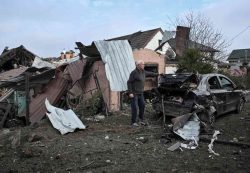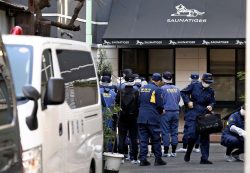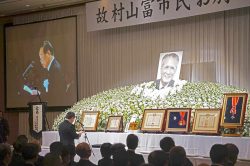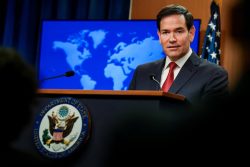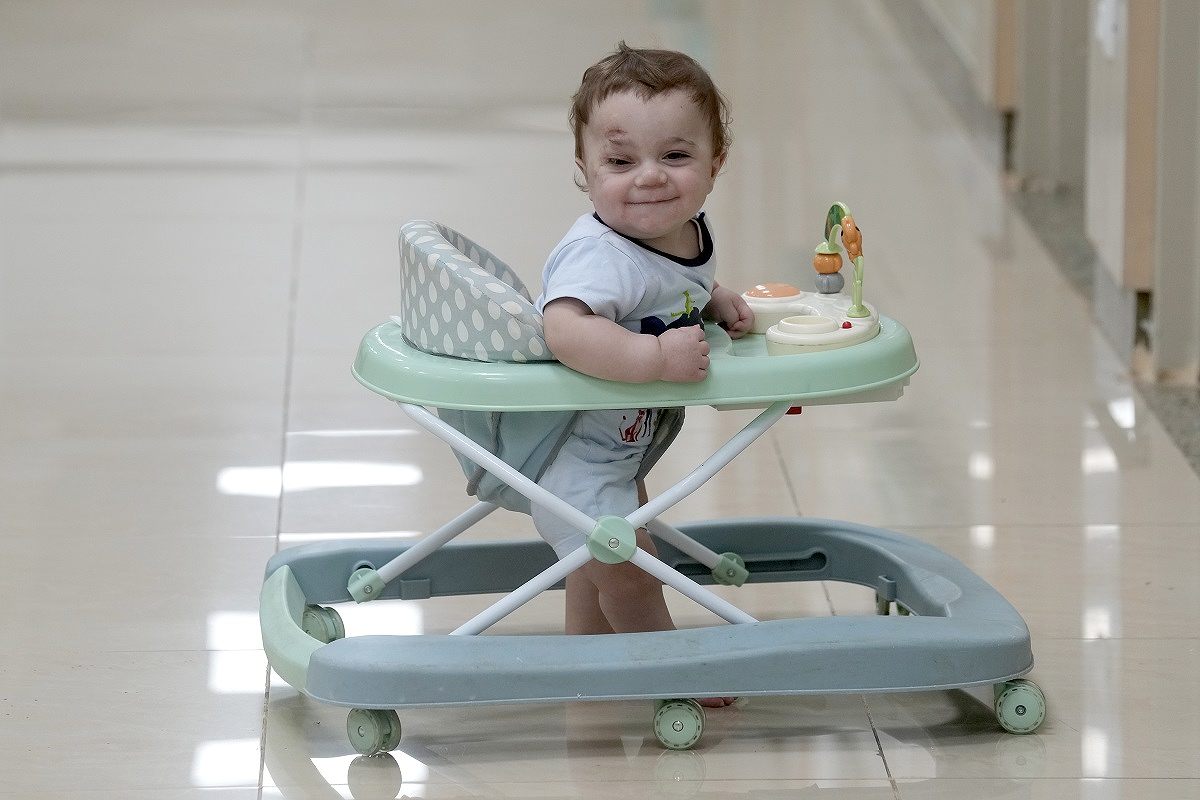
In this Aug. 14, 2024 photo, ten-month-old Palestinian infant Mostafa Qadoura, who has already lost his eye and his immediate family to the horrors of Israel’s war against Hamas in Gaza, plays at the New Administrative Capital Hospital, just outside Cairo, Egypt.
11:43 JST, August 24, 2024
CAIRO (AP) — When Mostafa Qadoura was a week old, an Israeli strike on his home in the Gaza Strip last October launched him and his crib into the air, sent shrapnel into his right eye that damaged it beyond repair and killed one of his brothers.
Mostafa was evacuated to Egypt weeks later when the hospital treating him came under siege by the Israeli army, and he has grown into a smiling and active 10-month-old with chubby cheeks. But he still faces huge challenges.
His mother and other brother were killed in a separate Israeli strike just days after he was evacuated. He will need a series of surgeries to adjust his artificial eye as his body grows. And it’s unclear whether he will return to Gaza before the war is over.
“I don’t know what to tell him when he grows up,” said his grandmother and guardian, 40-year-old Amna Abd Rabou, who was allowed in April to travel to Egypt to care for him. She and Mostafa flew to Malaysia last week for a surgery that is scheduled for Monday.
In a war that has claimed the lives of thousands of Palestinian children and injured more, Mostafa’s story is both uniquely gut-wrenching and, in many ways, familiar to countless families in Gaza devastated and displaced by the fighting between Israel and Hamas.
Mostafa is one of the roughly 3,500 Palestinians, mostly children, who have been evacuated from the Gaza Strip for medical treatment. Families there have submitted requests to have at least twice that number of injured children evacuated, according to the World Health Organization.
More than 12,000 children have been injured in the war, according to Palestinian health officials, and aid groups say many who have not been allowed to leave Gaza face health outcomes far less hopeful than Mostafa’s.
“We meet children whose lives are hanging by a thread because of the injuries of war or their inability to receive medical care for conditions like cancer,” said Tess Ingram, a spokesperson for UNICEF, the U.N.’s agency for children.
More medical evacuations would save lives and improve the futures of wounded children, Ingram said, “but above anything else, we need a cease-fire. It is the only way to stop the killing and maiming of children.”
The war began on Oct. 7, when Hamas fighters attacked southern Israel, killing some 1,200 people and taking roughly 250 hostages into Gaza. More than 40,000 Palestinians have been killed in the fighting since then, according to Gaza’s Health Ministry, which does not distinguish in its count between civilians and militants. At least a quarter were children, according to the ministry.
At the Administrative Capital Hospital in Cairo, Mostafa recently sat on his grandmother’s lap, playing with a rattle and grinning at the nurse who escorted him on his journey from Gaza to Egypt. His grandmother also smiled, saying she would take care of him as a promise to her deceased daughter.
After the late October strike that killed his 4-year-old brother, Ayes, and badly wounded his then 22-year-old mother, Halimah, Mostafa was found meters away from the destroyed home in Jabaliya in northern Gaza — and still inside his crib, according to his grandmother.
What followed was a familiar story of separation amid the chaos of the war, which has displaced close to 2 million Palestinians from their homes.
While Mostafa was receiving treatment for his injured eye and forehead at Shifa Hospital in Gaza City, his mother was having a leg amputated at a different hospital in northern Gaza, where she was also being treated for severe injuries to her neck, chest, and eyes.
“Relatives around me would tell me to pray and ask God to take her life to relieve her from pain, but I would tell them that she’s my daughter and I’ll take care of her and keep her the way she is regardless of her condition,” said Abd Rabou, who left two teenage children back in Gaza in the care of her husband.
While still recovering from her injuries, Mostafa’s mother moved to a large family home in Jabaliya, where a Nov. 22 strike killed her, her 6-year-old son, Bassam, and 50 other family members.
Abd Rabou said she doesn’t know what happened to Mostafa’s father, but she remembers what his mother said the day before she died.
“She grabbed my hand and told me she wanted to see Mostafa. She said she was afraid that she would never see him again,” Abd Rabou recalled.
The Qadoura family is not the only one in Gaza to have been nearly wiped out by the war.
The Israeli military, which rarely comments on individual strikes, has said it tries to avoid harming Palestinian civilians and blames their injuries and deaths on Hamas for operating in dense residential areas and sometimes sheltering in and launching attacks from homes, schools and mosques.
This month, the Israeli military acknowledged it struck a school-turned-shelter in central Gaza City, saying it hit a Hamas command center in the area without providing evidence.
In response to a query about the two strikes that hit the Qadoura family, a spokesman for the Israeli military said, “In stark contrast to Hamas’ intentional attacks on Israeli men, women and children, the (army) follows international law and takes feasible precautions to mitigate civilian harm.”
Mostafa’s family was unaware of his whereabouts after he and more than two dozen other babies were evacuated in November from Shifa Hospital. They thought he might have died until an uncle came across a local news story that mentioned an orphaned baby he suspected was Mostafa.
The uncle learned that Mostafa was first transferred to a hospital in Rafah, and that he was to be evacuated to Egypt along with 30 other sick and weak babies.
Bilal Tabasi, a nurse who traveled with Mostafa and the other evacuees, said they wrapped the premature babies who should have been in incubators in blankets to try to keep them warm. Three died before reaching the Egyptian border.
Mostafa was malnourished and dehydrated when he arrived at the border. He had also survived antibiotic-resistant bacteria that had infected his shrapnel wounds, Tabasi said.
“Mostafa was the most critical case I came across,” said Ramzy Mounir, director of the Administrative Capital Hospital in Cairo.
It’s unclear where Mostafa and his grandmother will go after his surgery in Malaysia, but she is hoping they can return to Egypt and stay there until the war ends. Wherever they land, Abd Rabou said she would never leave Mostafa’s side as she recalled some of his mother’s last words.
“She told me, ‘If anything happened to him, I’ll never forgive you,'” Abd Rabou said.
"News Services" POPULAR ARTICLE
-

American Playwright Jeremy O. Harris Arrested in Japan on Alleged Drug Smuggling
-

Japan’s Nikkei Stock Average as JGB Yields, Yen Rise on Rate-Hike Bets
-

Japan’s Nikkei Stock Average Licks Wounds after Selloff Sparked by BOJ Hike Bets (UPDATE 1)
-

Japan’s Nikkei Stock Average Buoyed by Stable Yen; SoftBank’s Slide Caps Gains (UPDATE 1)
-

Japanese Bond Yields Zoom, Stocks Slide as Rate Hike Looms
JN ACCESS RANKING
-

Keidanren Chairman Yoshinobu Tsutsui Visits Kashiwazaki-Kariwa Nuclear Power Plant; Inspects New Emergency Safety System
-

Imports of Rare Earths from China Facing Delays, May Be Caused by Deterioration of Japan-China Relations
-

University of Tokyo Professor Discusses Japanese Economic Security in Interview Ahead of Forum
-

Tokyo Economic Security Forum to Hold Inaugural Meeting Amid Tense Global Environment
-

Japan Pulls out of Vietnam Nuclear Project, Complicating Hanoi’s Power Plans



